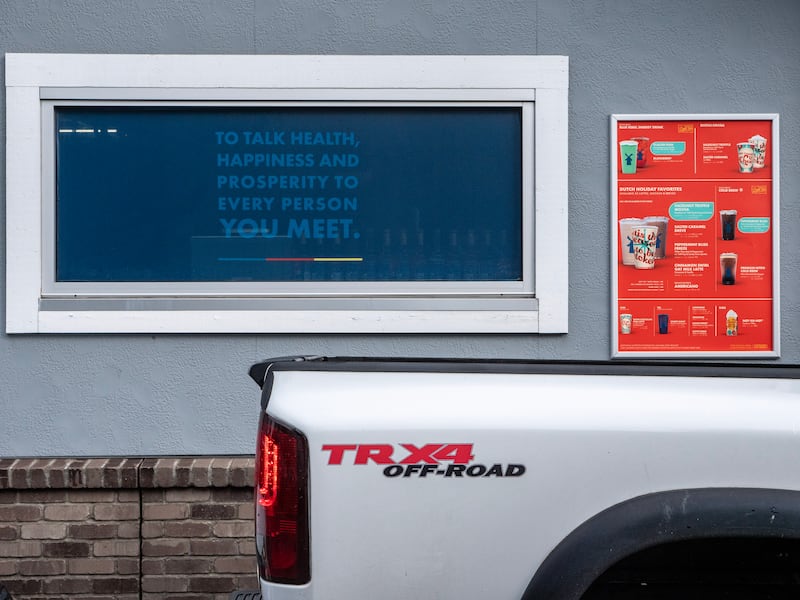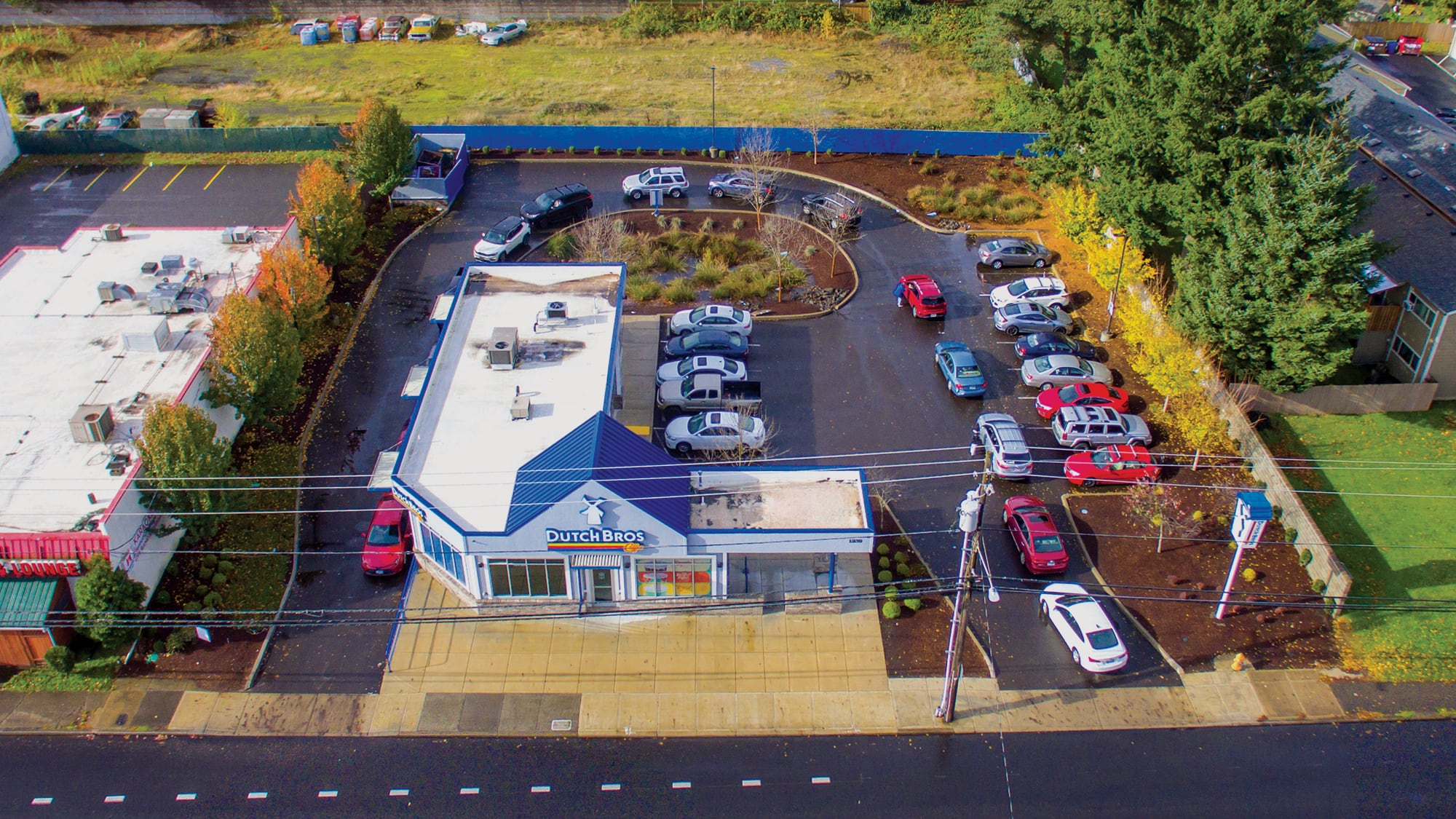Oregon’s nine Indigenous tribes are watching history repeat itself.
The tribes oppose a proposal for 225 betting terminals at the Flying Lark, a destination resort that the founder of Dutch Bros. Coffee is set to open at a Grants Pass horse track. The tribes say the terminals would violate Oregon law.
“If approved, I absolutely would consider it a casino—and the Oregon Constitution bans private casinos,” says Dan Courtney, chairman of the Cow Creek Band of Umpqua Tribe of Indians. “The primary purpose of the Flying Lark would be gambling. It markets itself as a gaming destination, which is code for casino.”
He and other tribal representatives say there is a strong measure of hypocrisy in the position of Gov. Kate Brown and other state officials who are standing by as the project moves forward: They are refusing to honor the state’s historical commitment to protect the tribes and limit gambling competition.
It’s common these days for public meetings in much of Oregon to begin with what’s known as a “stolen land acknowledgement.”
“No matter where you are in Oregon today, remember, you are on Indigenous land,” Gov. Kate Brown said on Oct. 11, Indigenous Peoples Day. “Oregon’s historical treatment of Indigenous people is stained by racism, discrimination, forced removal, and violence. We cannot change that past––but we can work together to dismantle the legacies of colonialism and racism just as they were built, brick by brick.”
Even as she spoke those words, Brown was standing to the side as the Oregon Racing Commission moved to threaten—in the eyes of the tribes—gambling that brings them nearly $500 million a year.
“These stolen land acknowledgments—that’s great, but is that as far as it goes? Are they just checking the box?” asks Justin Martin, a member of the Confederated Tribes of Grand Ronde and its Salem lobbyist for 25 years. “We appreciate the words but these are broken promises—again.”

In 1984, when voters created the Oregon Lottery, they also approved a constitutional prohibition of off-reservation casinos. That prohibition has been tested periodically, such as when private casino promoters asked voters to overturn it in 2012. Voters said no, 72% to 28%.
The Oregon Lottery, the state’s second-largest source of cash after income taxes, has expanded its offerings over time, most recently with mobile sports betting in 2019. Tribal officials view any more lottery expansion as a threat to the well-being of their collective 29,000 Oregon members.
So the tribes earlier this year asked the Legislature to consider House Bill 3394, which would have halted any expansion and then pulled all interested parties together in a task force to study future policy. The bill died in committee, for which some tribal leaders blame Brown. Her spokesman, Charles Boyle, says she had nothing to do with the bill’s demise.
In October, the Flying Lark, backed by Travis Boersma, billionaire co-founder of Dutch Bros. Coffee, submitted an application to the Oregon Racing Commission, which regulates horse racing in the state.
The plan: a destination resort at Grants Pass Downs, with restaurants, bars, live entertainment, RV parking and 225 terminals for betting. The application said the development would become the “epicenter of the horse industry in Oregon.”
It would also include offices for the Racing Commission and pay the commission about $200,000 a year. (After the closure of Portland Meadows in 2019, Grants Pass Downs is the state’s only commercial horse track. The commission also regulates racing at county fairs.)
The company hoped to capitalize on a loophole, which allows historical horse racing machines at racetracks. Whether those machines are legal is a matter of dispute.
“The Flying Lark, as part of Grants Pass Downs, is permitted to operate historical horse racing machines under Oregon law, which exempts HHR machines from the definition of ‘casino,’” says Erin Patterson, a spokeswoman for the project. “Just like offering gambling on horse racing at a racetrack does not turn a racetrack into a casino and offering lottery terminals at a restaurant or bar does not turn those locations into a casino, offering HHR machines on racetrack premises does not turn that racetrack into a casino.” (The tribes say the devices are glorified slot machines.)
The Flying Lark, ECONorthwest calculated, would immediately cost local tribal and lottery competitors $20 million a year. (The Cow Creek tribe’s Seven Feathers Casino Resort is 45 miles north on Interstate 5 at Canyonville.)
If the state’s four other county racetracks obtained similar licenses, ECONorthwest found, the lost revenue for the tribes and lottery could approach $100 million annually—by a simple vote of the Racing Commission.
Six tribal chairs implored Brown in an Oct. 6 letter, first reported by The Oregonian, to call a timeout.
She has declined to do so. “It would be inappropriate for the governor to weigh in on or interfere with a pending state agency license application process,” Boyle says, adding that Brown “values her close, decadeslong relationship with Oregon’s sovereign, federally recognized tribes” and “understands the importance of gaming issues to the tribes.”
To the tribes, Brown’s refusal to halt the process for more vetting is telling.
“Actions speak louder than words,” says Courtney, the Cow Creek chairman. “It’s clear now how shallow the respect for tribal sovereignty really is.”
Senate President Peter Courtney (D-Salem), no relation to Dan Courtney, says he’s distressed to see the Flying Lark project moving so quickly without legislative input.
“The fact that [the Flying Lark] may jeopardize Native Americans who rely so heavily on their casinos—that requires we look at this issue with some real thought and real honesty,” Courtney says. “I don’t think we’ve done that.”
House Speaker Tina Kotek (D-Portland) is on the same page. “The speaker agrees with the tribes’ concern about the unchecked expansion of gambling options,” says Kotek spokesman Danny Moran. “She supports a pause to allow for greater tribal consultation and the development of a comprehensive plan for the future of gambling policies and regulations.”
The Racing Commission was scheduled to take up the Flying Lark’s application at its Nov. 18 meeting. Jack McGrail, the commission’s executive director, says the application has been pulled from this month’s agenda and not yet rescheduled. He adds that his commission does not make tax policy and would only approve the application if it conforms with all applicable laws.
The tribes hope Gov. Brown will intercede with commissioners to delay their decision for further consultation.
Boyle says that would be inappropriate, adding that the Flying Lark decision is “no different than the hundreds of other licensing decisions that other state agencies, boards and commissions make.”
Martin, the Grand Ronde lobbyist, says that stance is insulting. “It’s a transfer of wealth—the casino money we use for housing, health care and other services—for the benefit of one wealthy individual,” Martin says. “That’s all this is.”
